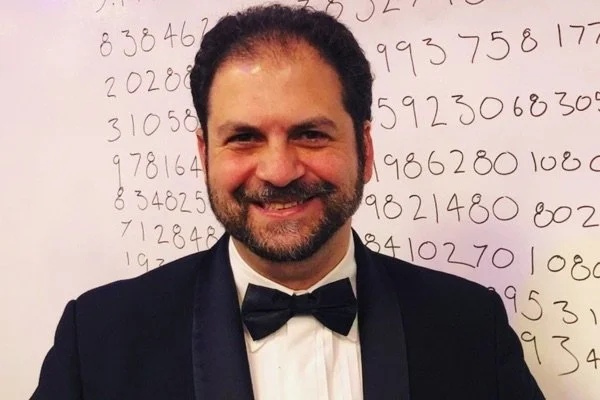Think You Have a Bad Memory? It Might Be Something Deeper
You meet someone, hear their name, and it’s gone before the handshake ends.
You walk into a room and forget why you’re there.
You read a page, and seconds later, it’s blank.
The first thought that often comes up is:
“I must have a terrible memory.”
But what if your memory isn’t the problem at all?
What if forgetfulness is just a symptom, a signal of something deeper that’s happening underneath?
In this lesson, I’ll show you why forgetting often has less to do with intelligence or “bad memory,” and more to do with your mental, emotional, and physical state, and how to identify and fix it.
The Myth of a “Bad Memory”
When people say they have a bad memory, they usually mean they can’t remember names, faces, things they’ve read, or where they left their keys.
But memory itself isn’t broken, it’s most of the times distracted.
Memory is a system. It works best when your attention, focus, and emotional state are in sync.
If any of these are off, stress, fatigue, pain, anxiety, even excitement, the system can be prone to glitches. The result? You forget.
That’s why even the most skilled memory athletes (myself included) forget things when under pressure, or when something else in life is draining attention.
Why You Forget Has More Layers Than You Think
Here are some of the most common “hidden” reasons behind forgetfulness:
1. Stress and Anxiety
When your mind is overloaded, your focus narrows to survival.
You can’t remember a name or a detail because your brain is prioritizing safety, not storage.
Think of stress as static on a radio. The signal (the memory) is still there, but the noise blocks it.
2. Physical Discomfort or Fatigue
Pain, poor sleep, dehydration, or illness drain your mental energy.
If your body is fighting to stay balanced, it has less energy to encode and recall information.
You can’t store memories efficiently when your brain is underpowered.
3. Negative Environment
If your surroundings are chaotic, noisy, or uninspiring, focus fragments.
Environmental stressors, constant notifications, cluttered spaces, bad lighting - make your brain jump between too many inputs.
It’s not bad memory. It’s attention fatigue.
4. Emotional Overload
Strong emotions, both positive and negative, can overwhelm the brain’s short-term memory.
Ever been so excited or upset that you completely forgot what someone said five seconds ago?
That’s your emotional brain (amygdala) hijacking your logical one (prefrontal cortex).
5. Mindset and Belief
If you constantly tell yourself, “I’m forgetful,” your brain takes it as truth.
You stop paying attention because you’ve already predicted failure.
The more you reinforce that belief, the more your brain filters information accordingly.
The Power of Reflection: Discovering Your Forgetting Patterns
If you keep forgetting similar things - names, details, tasks - there’s usually a pattern behind it.
But you can’t fix what you don’t see.
That’s why one of the simplest and most powerful tools I recommend to my clients is the Forgetfulness Log.
It sounds simple, but it’s transformative.
How to Create a Forgetfulness Log
Start by recording every instance you forget something.
Use your phone, a small notepad, or a digital notes app, whatever is easiest to access quickly.
Write down:
Date and time
What you forgot (name, item, detail, etc.)
What was happening before (your mood, situation, any stressors)
How you felt in the moment
It might look like this:
October 9 – Forgot colleague’s name during meeting. Had a headache, felt tense, rushed from another call.
At first, this might feel tedious. But after a week or two, you’ll start noticing patterns.
Maybe every time you forget, you were tired, multitasking, or anxious.
That’s gold. Because once you identify the cause, you can fix it.
From Awareness to Action
Here’s how to interpret your log and what to do about it.
If You Notice It’s Stress-Related
Build a mental “pause” before entering situations that require focus.
Take one deep breath. Slow down.
If you’re meeting someone, remind yourself: “I’m going to remember this person’s name.”
That single moment of awareness activates your prefrontal cortex, the part responsible for attention and encoding.
If It’s Physical
Hydrate, rest, stretch, and eat properly before mentally demanding work.
Your brain is 70% water and runs on glucose and oxygen. When it’s under-fueled, memory is the first to drop.
If It’s Environmental
Simplify your workspace. Turn off notifications. Use noise-cancelling headphones.
The less visual and auditory clutter, the easier your brain can focus.
If It’s Mindset
Start replacing “I always forget” with “I’m learning to remember.”
It sounds small, but your self-talk shapes your brain’s expectations.
If It’s Emotional
Try grounding techniques before high-stakes situations - slow breathing, focusing on a specific sensory detail (like how the chair feels), or visualizing calm.
This reduces emotional interference so memory can do its job.
Why Writing It Down Works
You might wonder: why not just remember when I forget?
Because you won’t.
Logging externalizes what your brain can’t hold while it’s overwhelmed. It creates distance. A mirror that lets you observe your mind, not be trapped inside it.
Over time, this practice improves metacognition, your ability to think about your thinking.
That’s one of the most powerful cognitive skills for memory improvement.
In fact, this is one of the same reflection techniques I use when coaching high performers and executives. Once they track when they forget, the pattern becomes obvious. The solution follows naturally.
Be Your Own Coach
You don’t need to be a memory expert to start improving your memory.
You just need to learn to coach yourself.
Coaching yourself means:
Observing without judgment
Asking questions like, “What was really happening when I forgot?”
Testing small changes to see what helps
Repeating what works
This is how you shift from “Why am I forgetting?” to “How can I improve this?”
And here’s the beautiful part, when you start doing this, you’re not just improving memory, you’re training your brain to think strategically, calmly, and consciously.
That’s the real superpower.
From Forgetting to Learning
Let’s look at what this might look like in real life.
Example 1: The Forgetful Meeting
You forget someone’s name right after introductions.
Instead of blaming your “bad memory,” you check your log.
You realize it always happens when you’re rushing between tasks.
So next time, you take 10 seconds before the meeting, breathe, and remind yourself: “Listen for the name.”
You instantly remember.
Example 2: The Lost Focus at Work
You forget what you were doing mid-task.
Your log shows it happens most in the afternoon when you haven’t eaten.
You adjust your lunch timing and hydration - focus improves.
Example 3: The Study Fog
While reading, you realize you’ve re-read the same line three times.
You check your environment - music too loud, too many browser tabs open.
You fix the setup, and suddenly the content sticks.
Small insights like these compound fast.
Honesty Is the Hard Part
The most important step in this process is honesty.
If you blame “bad memory” without reflection, you’ll never see the real cause.
Be brutally honest with yourself about what’s really happening.
Maybe you’re mentally overloaded.
Maybe you’re emotionally drained.
Maybe you just haven’t trained your attention muscles enough yet.
All of those are fixable.
But they only become visible when you look.
Why This Works (and Why It Lasts)
When you log forgetfulness and reflect, you’re doing three critical things simultaneously:
Building awareness – You catch yourself in the act of forgetting.
Creating pattern recognition – You learn what situations trigger lapses.
Training problem-solving – You start testing improvements proactively.
This isn’t about perfection. It’s about progress through self-awareness.
And the more you practice, the more automatic it becomes, your brain learns to self-correct in real time.
Turning Insight into Long-Term Change
Once you start identifying patterns, decide on one small improvement at a time:
Better sleep schedule
Mindful breathing before meetings
Healthier food before study sessions
Dedicated focus time without distractions
You don’t have to overhaul your life, just change one variable at a time and watch your recall improve.
Over weeks, this awareness turns into consistency.
And consistency is the foundation of mastery.
You’re Never Too Old (or Too Far Gone)
I’ve coached clients in their 90s who’ve retrained their memory.
I’ve worked with stroke survivors and people recovering from brain injuries who rebuilt recall through patience, practice, and the right techniques.
Your brain’s ability to grow, called neuroplasticity, doesn’t expire.
It adapts as long as you keep learning.
The goal isn’t to never forget, it’s to understand why you forget, so you can prevent it next time.
How to Start Today
Here’s a simple action plan:
Start your forgetfulness log, pick an easy place to track notes.
Add at least one entry each day for a week.
Look for patterns, emotional, physical, environmental.
Pick one factor to change.
Test it for seven days.
Reflect again.
That’s how you turn awareness into progress.
And remember, if you find patterns but don’t know what to do next, ask for help.
That could be a coach, a psychologist, or a trusted mentor.
You don’t have to fix everything alone.
Final Thoughts
You might think you have a “bad memory.”
But what if you simply have an untrained or distracted one?
Your memory isn’t broken, it’s trying to tell you something.
Stress, fatigue, clutter, self-doubt, these are signals, not flaws.
When you start tracking your forgetfulness and reflecting honestly, you gain the power to improve it.
And once you do that, you’re no longer reacting to memory lapses, you’re mastering them.
So start today.
Be your own coach.
Keep your log.
Reflect, learn, and adjust.
Over time, you’ll discover what my clients often do:
You don’t have a bad memory.
You just needed to understand it better.
And if you’d like help to really master your memory, let’s have a chat. You can book a free memory consultation and we can discuss your goals further.
👉 Book your free memory consultation


